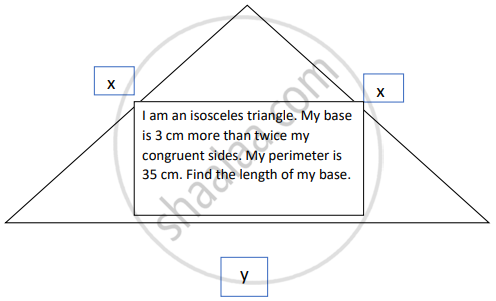Advertisements
Advertisements
Question
In an envelope there are some 5 rupee notes and some 10 rupee notes. Total amount of these notes together is 350 rupees. Number of 5 rupee notes are less by 10 than twice number of 10 rupee notes. Then find the number of 5 rupee and 10 rupee notes.
Solution
Let the number of Rs 5 notes be x and the number of Rs 10 notes be y.
5x + 10y = 350 ...(I)
Number of 5 rupee notes are less by 10 than twice number of 10 rupee notes
∴ x = 2y – 10
∴ x – 2y = –10 ...(II)
Multiplying equation (II) by 5,
5x – 10y = –50 ...(III)
Adding equations (I) and (III)
5x + 10y = 350
+ 5x – 10y = –50
10x = 300
∴ x =`300/10`
∴ x = 30
Substituting x = 30 in equation (II),
x – 2y = –10
30 – 2y = –10
∴ 30 + 10 = 2y
∴ 40 = 2y
∴ y = `40/2`
∴ y = 20
Number of Rs 5 notes = 30, number of Rs 10 notes = 20
Notes
There is an error in the textbook question.
APPEARS IN
RELATED QUESTIONS
Form the pair of linear equation in the following problem, and find its solution (if they exist) by the elimination method:
The sum of the digits of a two-digit number is 9. Also, nine times this number is twice the number obtained by reversing the order of the digits. Find the number.
Ajay is younger than Vijay by 5 years. Sum of their ages is 25 years. What is Ajay's age?
Solve the following simultaneous equation.
x + y = 11 ; 2x - 3y = 7
Solve the following simultaneous equation.
`2/x + 3/y = 13` ; `5/x - 4/y = -2`
By equating coefficients of variables, solve the following equations.
3x - 4y = 7; 5x + 2y = 3
Complete the activity.

The solution of the equation ax + by + 5 = 0 and bx − ay − 12 = 0 is (2, – 3). Find the values of a and b
The angles of a cyclic quadrilateral ABCD are ∠A = (6x + 10)°, ∠B = (5x)°, ∠C = (x + y)°, ∠D = (3y – 10)°. Find x and y, and hence the values of the four angles.
The ratio of two numbers is 2:3. If 5 is added in each numbers, then the ratio becomes 5:7 find the numbers.
The ratio of two numbers is 2:3.
So, let the first number be 2x and the second number be `square`.
From the given condition,
`((2x) + square)/(square + square) = square/square`
`square (2x + square) = square (square + square)`
`square + square = square + square`
`square - square = square - square`
`- square = - square`
x = `square`
So, The first number = `2 xx square = square`
and, Second number = `3 xx square = square`
Hence, the two numbers are `square` and `square`
Read the following passage:
Two schools 'P' and 'Q' decided to award prizes to their students for two games of Hockey ₹ x per student and Cricket ₹ y per student. School 'P' decided to award a total of ₹ 9,500 for the two games to 5 and 4 Students respectively; while school 'Q' decided to award ₹ 7,370 for the two games to 4 and 3 students respectively. |
Based on the above information, answer the following questions:
- Represent the following information algebraically (in terms of x and y).
- (a) What is the prize amount for hockey?
OR
(b) Prize amount on which game is more and by how much? - What will be the total prize amount if there are 2 students each from two games?
